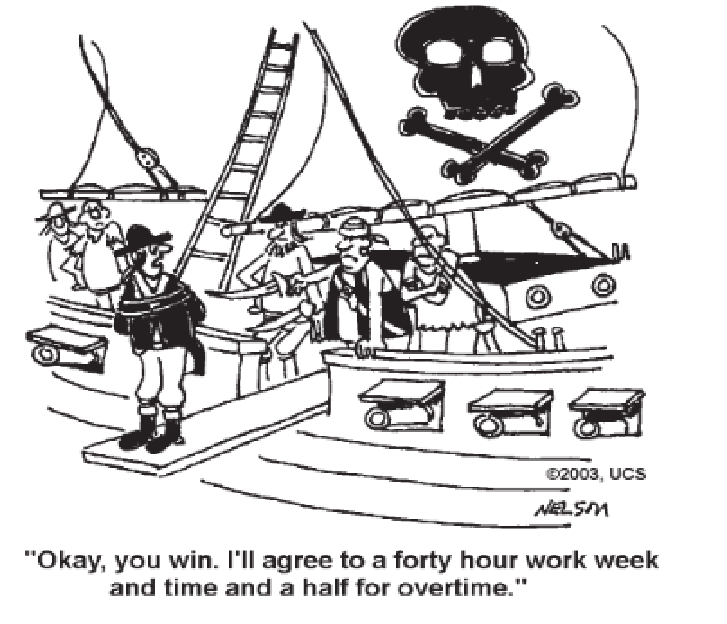On March 31, 2003, the Department of Labor (DOL) proposed a regulation that would make millions of workers ineligible for overtime pay under the Fair Labor Standards Act. DOL plans to issue a final regulation later this year. Legislation introduced by Representatives Peter King and George Miller would stop the Administration from implementing any regulation that takes away workers’ right to overtime pay.
The entire labor movement is waging an aggressive lobbying effort over the next weeks to secure co-sponsors to the King-Miller legislation. Please call members of your Congressional delegation and if possible meet with them to secure their
support. Following are talking points that outline the reasons for Labor’s opposition to the DOL rule and reasons for your Members of Congress to support the King/Miller legislation.
The DOL proposal would make it much easier for employers to reclassify workers as “white collar” employees ineligible for overtime.
The Fair Labor Standards Act (FLSA) of 1938 requires employers to pay their employees a cash premium for overtime work, but provides a narrow exception for white collar employees in “executive,” “administrative,” and “professional” positions. The DOL proposal would make it much easier for businesses to avoid paying workers anything for overtime work by dramatically loosening the criteria for these exceptions. DOL would also create a new exception for “highly compensated employees,” effectively denying overtime protection to workers earning more than $65,000 (not indexed to inflation).
The DOL proposal would strip overtime rights from more than 8 million workers.
The Economic Policy Institute (EPI) has concluded that the proposed regulation would strip overtime rights from over 8 million workers in the 78 job titles EPI examined. Given that EPI examined only 78 of more than 250 white collar job titles, the total number of workers affected would be much higher. A representative for the Society of Human Resource Management (SHRM), an employer organization, says, “This is going to affect every workplace, every employee, and every
professional.”

The DOL proposal would strip overtime rights from many kinds of workers in many industries.
The DOL proposal would exclude from overtime protection large numbers of workers in the aerospace, defense, health care,
and high tech industries. Workers likely to lose their eligibility for overtime pay include mid-level office workers, lower-level supervisors, licensed practical nurses, newspaper reporters, policemen, firefighters, EMTs, paramedics, cooks, secretaries, dental hygienists, air traffic controllers, social workers, occupational therapists, dieticians, physical therapists, administrative support, computer support, drafters, surveyors, designers, graphic artists, engineering technicians, planners, assistant and associate architects, health technicians, and paralegals.
The DOL proposal would fail to guarantee overtime eligibility for low-income workers.
Under current law, workers are automatically eligible for overtime pay if their income is lower than a minimum salary threshold. This threshold, last adjusted in 1975, would be $26,520 today if adjusted for inflation. The DOL proposal would
raise the minimum threshold to only $22,100, leaving workers worse off than they were in 1975. DOL claims that raising the salary threshold to $22,100 would make 1.3 million more lower-income workers automatically eligible for overtime pay, but
over time fewer and fewer workers would be protected because the proposed regulation does not index the threshold to inflation. Moreover, the DOL proposal itself coaches employers how to avoid any pay increase for these lower-income workers.
The DOL proposal would undermine the 40-hour workweek.
The many millions of workers denied overtime protection under the DOL proposal would no longer be paid anything for their overtime work. If employers no longer have to pay extra for overtime, they will have an incentive to demand longer hours, and workers will have less time to spend with their families.
The DOL proposal would be a pay cut.
Millions of workers depend on overtime pay to make ends meet, and in 2000 overtime pay accounted for about 25% of the income of workers who worked overtime. Workers stripped of their overtime protection would end up working longer
hours for less pay. The DOL proposal would even cut the pay of workers not excluded from overtime protection because employers would naturally shift overtime assignments to the millions of workers no longer entitled to overtime pay.
There is no justification for taking away workers’ overtime rights.
There is broad consensus that an adjustment of the minimum salary threshold for inflation is long overdue. But “updating” the white collar regulations does not require stripping any workers of their overtime protection. The proposed regulation does not even accomplish its purported objective of clarifying the criteria for the white collar exclusions and avoiding litigation: it would make the rules more confusing by replacing well-established standards with vague and ambiguous language, and would spawn litigation over the meaning of these new rules. According to the Chicago Tribune, “The Labor Department’s [Tammy]
McCutchen predicts a deluge of lawsuits as employees and employers press for clarifications once the new rules go into effect.”

DOL has no statutory authority to exclude millions of workers from overtime protection.
DOL does not have statutory authority to implement such a drastic cutback in overtime eligibility absent congressional action. The proposed regulation even creates a new exception (“highly compensated employees”) not found in the FLSA—and precisely the type of limitation Congress rejected in 1938.
Legislation is necessary to stop the DOL proposal.
Rep. Peter King has introduced legislation to stop the Administration from stripping any workers of their overtime protection. This legislation would not stop the Administration from raising the minimum salary threshold, however, or from clarifying the criteria for the white collar exceptions in ways that do not take away workers’ overtime rights. Members of Congress who oppose stripping millions of workers of their eligibility for overtime pay should cosponsor the King bill, or parallel legislation to be introduced in the Senate.

